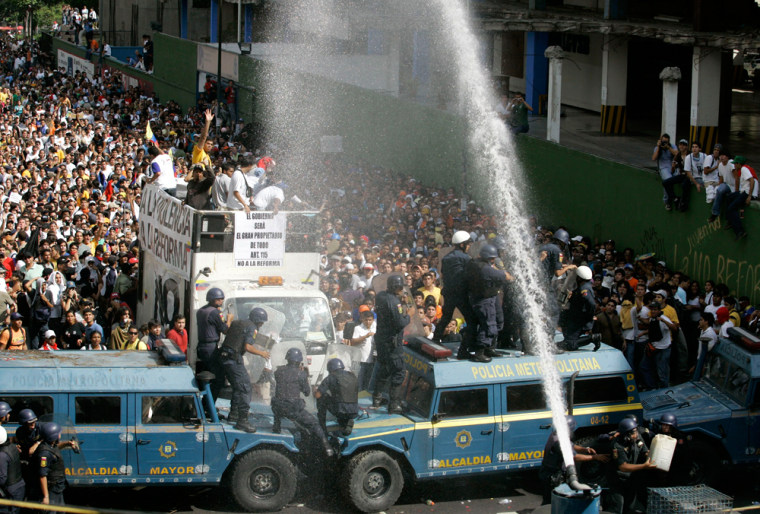Troops used tear gas and water cannons Thursday to disperse demonstrators who turned out by the tens of thousands to protest constitutional reforms that would permit President Hugo Chavez to run for re-election indefinitely.
Led by university students, demonstrators chanted “Freedom! Freedom!” and warned that 69 amendments drafted by Venezuela’s Chavista-dominated National Assembly would violate civil liberties and derail democracy.
Authorities broke up the protest outside the electoral agency’s office. There were no reports from authorities of arrests or serious injuries, but the local Globovision television channel showed footage of several students who suffered minor injuries.
Students also hurled rocks and bottles. A few lifted up sections of metal barricades and thrusted them against police holding riot shields. Students retreated later as police fired plastic bullets.
“Chavez wants to remain in power his entire life, and that’s not democracy,” said Gonzalo Rommer, a 20-year-old university student, who joined protesters as they marched to the National Elections Council.
Official blames students for violence
Deputy Justice Minister Tarek El Aissami blamed students for the violence, saying they forced their way through police barricades. But Vicente Diaz, one of the National Election Council’s five directors, criticized National Guardsmen and police for using excessive force to disperse protesters.
“We absolutely condemn the behavior of the authorities,” Diaz said.
The amendments would give the government control over the Central Bank, create new types of cooperative property, allow authorities to detain citizens without charges during a state of emergency and extend presidential terms from six to seven years while allowing Chavez to run again in 2012.
Opposition parties, human rights groups and representatives of the Roman Catholic Church fear civil liberties would be severely weakened under the constitutional changes.
Chavez — a close ally of Cuban leader Fidel Castro — denies the reforms threaten civil liberties. He and his supporters say the changes will help move the country toward socialism, while giving neighborhood-based assemblies more decision-making power in using government funds for local projects like paving streets and building public housing.
